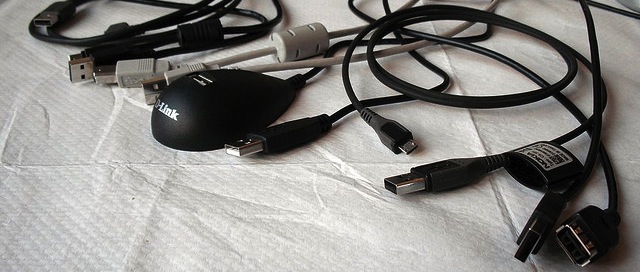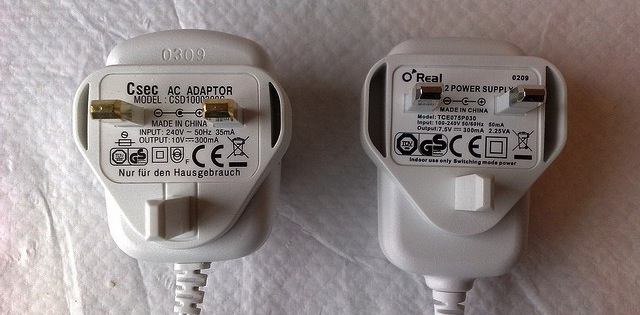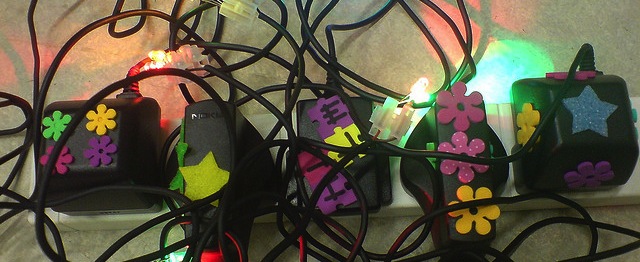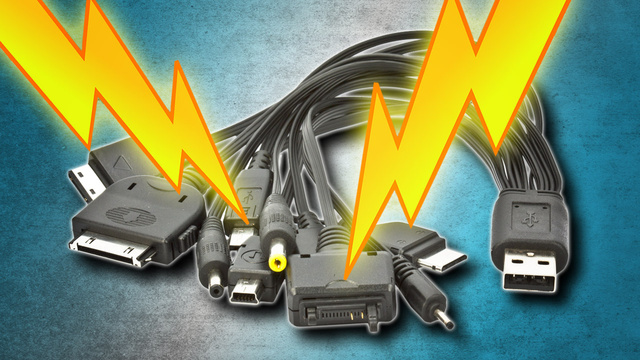Dear Lifehacker, I have a lot of chargers lying around from various mobile phones and laptops I’ve owned over the years. They all seem to work fine enough, but I’m a little scared after reading about the woman who was electrocuted by a charger. Does it matter which charger I use? Sincerely, Veronica Voltage
Dear VV,
We’re certainly no strangers to having a million chargers sitting around. The short answer to your question is, yes, the charger does matter, even if the charger fits. How much depends on what you’re charging though.
Make Sure the Plugs Are Right

The first thing you really need to consider when you’re grabbing a charger is the most obvious: if the connector fits. That means the plug on the end of the charger actually fits into your gadget properly.
For something like a mobile phone, this is usually a USB cable (of which various sizes exist), unless it’s an Apple device with a special 30-pin or Lightning connector. Older phones might have a cylindrical connector. Likewise, laptops have all kinds of connectors, and many of them are proprietary to the manufacturer. In some cases, you’ll need to order a special charger just for your device.
What all this means is that if you have a charger that fits into your gadget, you’re on the right track, but you’re not done yet. It’s time to look at the technical details.
When Voltage, Amperage and Wattage Matters

After you’ve figured out that you can actually connect the charger to your gadget, you need to figure out if doing so will make it explode or not. This means checking the voltage, amperage and wattage on your charger to make sure it will work with your device.
On most chargers, you’ll find the voltage listed somewhere on the power brick. Voltage is what pulls energy into the device. If the voltage is too high, you might end up shorting out your devices because you’ll overload the circuits. For mobile phones and other mobile devices like the Kindle that charge with USB, the voltage is typically 5V. A laptop charger might be as high as 14V or 15V. You can usually find the voltage your device needs on the device itself, on the battery, or on the manufacturer’s website. You’ll almost always find the voltage supplied by your charger on the charger itself. You want the voltage on your device to match the voltage provided by the charger.
Likewise, amperage is just as important. Amps are the current that’s supplied to your device. Think of it like a river, and the amperage is how wide that river is. Amps are usually listed on your power supply as something like, 2.7A or 1A. This regulates how much power flows through from the power supply to your device. The amperage listed on your power supply needs to match or exceed the amperage required by your device.
You will also often find wattage on your power brick, and that makes a difference as well, but it’s not dangerous if your wattage doesn’t match. Watts are supplied “on demand” to the battery that’s being charged, so even if you’re over the device’s limit, it doesn’t cause problems.
For example, an iPad charger puts out 10W, whereas an iPhone charger puts out 5W. You can charge an iPhone with an iPad charger just fine, because the iPhone’s battery will only take in 5W, even though the charger can supply 10W. A laptop will typically call for watts between 45 and 100. Not all chargers will list the watts, but if the amps and voltage match, you’re usually in the clear.
As Popular Mechanics points out, there’s a bit more to picking the right charger, but voltage, amps and watts are all we need to really worry about. As Extremetech points out, if you’re using a USB charger, it doesn’t really matter, because they’re almost all the same, but it’s still worth double-checking to make sure you’re in the clear.
When to Stay Away from Knockoffs

Chargers can be expensive for no good reason, but you’re better off sticking with official chargers or off-brand chargers as opposed to knockoffs.
The reason is that counterfeit and off-brand chargers are poorly made, and that means they put your device (and your house) at risk. Many ignore safety standards completely, but they also just don’t charge your devices that well, because they don’t push the amount of power they’re supposed to. This means you’re spending more time with these devices plugged in, which causes a larger risk to your safety, as well as your device.
That’s about it. If you pick the right charger, your devices will charge as quickly as they’re supposed, and your house won’t burn down.
Cheers
Lifehacker
Pictures: ninsiri (Shutterstock), nemo, fsse8info, fsse8info, matthew venn
Got your own question you want to put to Lifehacker? Send it using our [contact text=”contact form”].

Comments
2 responses to “Ask LH: Does It Matter Which Charger I Use?”
The description could have been written a lot better. The amperage and wattage are the capacity of the charger under the full rated load.
This gives a lot more detail: http://www.righto.com/2012/10/a-dozen-usb-chargers-in-lab-apple-is.html
For circular plugs, beware incorrect polarity
laptops are nearly always 19V give or take a few.
The wattage listed on a charger is equal to the product of the amps and voltage of that charger. For example a 90W laptop charger is typically 19.5v by 4.68A or thereabouts.